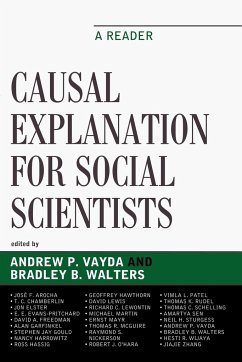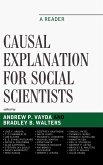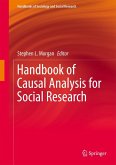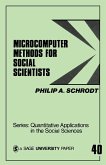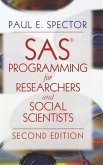Causal Explanation for Social Scientists
A Reader
Herausgeber: Vayda, Andrew P.; Walters, Bradley B.
Causal Explanation for Social Scientists
A Reader
Herausgeber: Vayda, Andrew P.; Walters, Bradley B.
- Broschiertes Buch
- Merkliste
- Auf die Merkliste
- Bewerten Bewerten
- Teilen
- Produkt teilen
- Produkterinnerung
- Produkterinnerung
All social scientists, despite their differences on many issues, ask causal questions about the world. In this anthology, Andrew P. Vayda and Bradley B. Walters set forth strategy and methods to answer those questions.
Andere Kunden interessierten sich auch für
![Causal Explanation for Social Scientists Causal Explanation for Social Scientists]() Causal Explanation for Social Scientists179,99 €
Causal Explanation for Social Scientists179,99 €![Cognitive Model of the Causal Explanation ofAnti-Semitism Cognitive Model of the Causal Explanation ofAnti-Semitism]() Andras GabrisCognitive Model of the Causal Explanation ofAnti-Semitism32,99 €
Andras GabrisCognitive Model of the Causal Explanation ofAnti-Semitism32,99 €![Explanation and Experience in Social Science Explanation and Experience in Social Science]() Robert BrownExplanation and Experience in Social Science70,99 €
Robert BrownExplanation and Experience in Social Science70,99 €![Explaining Human Actions and Environmental Changes Explaining Human Actions and Environmental Changes]() Andrew P. VaydaExplaining Human Actions and Environmental Changes163,99 €
Andrew P. VaydaExplaining Human Actions and Environmental Changes163,99 €![Handbook of Causal Analysis for Social Research Handbook of Causal Analysis for Social Research]() Handbook of Causal Analysis for Social Research64,99 €
Handbook of Causal Analysis for Social Research64,99 €![Microcomputer Methods for Social Scientists Microcomputer Methods for Social Scientists]() SchrodtMicrocomputer Methods for Social Scientists45,99 €
SchrodtMicrocomputer Methods for Social Scientists45,99 €![SAS Programming for Researchers and Social Scientists SAS Programming for Researchers and Social Scientists]() Paul E. SpectorSAS Programming for Researchers and Social Scientists187,99 €
Paul E. SpectorSAS Programming for Researchers and Social Scientists187,99 €-
-
-
All social scientists, despite their differences on many issues, ask causal questions about the world. In this anthology, Andrew P. Vayda and Bradley B. Walters set forth strategy and methods to answer those questions.
Hinweis: Dieser Artikel kann nur an eine deutsche Lieferadresse ausgeliefert werden.
Hinweis: Dieser Artikel kann nur an eine deutsche Lieferadresse ausgeliefert werden.
Produktdetails
- Produktdetails
- Verlag: Altamira Press
- Seitenzahl: 338
- Erscheinungstermin: 16. Februar 2011
- Englisch
- Abmessung: 229mm x 152mm x 18mm
- Gewicht: 491g
- ISBN-13: 9780759113268
- ISBN-10: 0759113262
- Artikelnr.: 32737700
- Herstellerkennzeichnung
- Libri GmbH
- Europaallee 1
- 36244 Bad Hersfeld
- gpsr@libri.de
- Verlag: Altamira Press
- Seitenzahl: 338
- Erscheinungstermin: 16. Februar 2011
- Englisch
- Abmessung: 229mm x 152mm x 18mm
- Gewicht: 491g
- ISBN-13: 9780759113268
- ISBN-10: 0759113262
- Artikelnr.: 32737700
- Herstellerkennzeichnung
- Libri GmbH
- Europaallee 1
- 36244 Bad Hersfeld
- gpsr@libri.de
Andrew P. Vayda is professor emeritus of anthropology and ecology at Rutgers University. Bradley B. Walters is professor of geography and environment at Mount Allison University in New Brunswick.
Introductory Essay: Pragmatic Methods and Causal-History Explanations by
Andrew P. Vayda and Bradley B. Walters Part I. A Pragmatic View of Causal
Explanation Chapter 1. Causal Explanation by David Lewis Chapter 2. The
Notion of Witchcraft Explains Unfortunate Events by E. E. Evans-Pritchard
Chapter 3. Geertz and the Interpretive Approach in Anthropology by Michael
Martin Part II. Causal Histories of Events Chapter 4. The Range and Power
of Narrative Style in Science by Stephen Jay Gould Chapter 5. Famines by
Amartya Sen Chapter 6. Analysis or Reductionism? by Ernst Mayr Chapter 7.
The Role of Fact in the Particular and the General by Richard C. Lewontin
Chapter 8. Explanatory Relativity by Alan Garfinkel Part III.
"How-Possibly" Explanations Chapter 9. Homage to Clio, or Toward an
Historical Philosophy for Evolutionary Biology by Robert J. O'Hara Part IV.
Systems and Structures Chapter 10. Plague and Fertility in Early Modern
Europe by Geoffrey Hawthorn Part V. Theories, Generalizations, and
Practical Judgments Chapter 11. Thermostats, Lemons, and Other Families of
Models by Thomas C. Schelling Chapter 12. Rice Harvesting: A View from the
Theory of Common Property by Neil H. Sturgess and Hesti Wijaya Part VI.
Causal Reasoning: Forms, Results, and Caveats Chapter 13. Statistical
Models and Shoe Leather by David A. Freedman Chapter 14. The Method of
Multiple Working Hypotheses by T.C. Chamberlin Chapter 15. Confirmation
Biase: A Ubiquitous Phenomenon in Many Guises by Raymond S. Nickerson
Chapter 16. The Last Northern Cod by Thomas R. McGuire Chapter 17. The Body
of the Detective Model: Charles S. Peirce and Edgar Allan Poe by Nancy
Harrowitz Chapter 18. Thinking and Reasoning in Medicine by Vimla L. Patel,
Jose F. Arocha, and Jiajie Zhang Chapter 19. On Types of Scientific
Inquiry: The Role of Qualitative Reasoning by David A. Freedman Chapter 20.
Counterfactuals and Revisionism in Historical Explanation by Ross Hassig
Part VII. Consequence Explanations and their Misuse Chapter 21. The
Obsessional Search for Meaning by Jon Elster Chapter 22. Confirmation Bias
in Consequence Explanations by Andrew P. Vayda Part VIII. Dos and Don'ts in
Interdisciplinary Research on Causes of Events Chapter 23. Dos and Don'ts
in Interdisciplinary Research on Causes of Fires in Tropical Moist Forests:
Examples from Indonesia by Andrew P. Vayda Chapter 24. Critical Regions,
Ecosystem Management, and Human Ecosystem Research by Thomas K. Rudel Index
Andrew P. Vayda and Bradley B. Walters Part I. A Pragmatic View of Causal
Explanation Chapter 1. Causal Explanation by David Lewis Chapter 2. The
Notion of Witchcraft Explains Unfortunate Events by E. E. Evans-Pritchard
Chapter 3. Geertz and the Interpretive Approach in Anthropology by Michael
Martin Part II. Causal Histories of Events Chapter 4. The Range and Power
of Narrative Style in Science by Stephen Jay Gould Chapter 5. Famines by
Amartya Sen Chapter 6. Analysis or Reductionism? by Ernst Mayr Chapter 7.
The Role of Fact in the Particular and the General by Richard C. Lewontin
Chapter 8. Explanatory Relativity by Alan Garfinkel Part III.
"How-Possibly" Explanations Chapter 9. Homage to Clio, or Toward an
Historical Philosophy for Evolutionary Biology by Robert J. O'Hara Part IV.
Systems and Structures Chapter 10. Plague and Fertility in Early Modern
Europe by Geoffrey Hawthorn Part V. Theories, Generalizations, and
Practical Judgments Chapter 11. Thermostats, Lemons, and Other Families of
Models by Thomas C. Schelling Chapter 12. Rice Harvesting: A View from the
Theory of Common Property by Neil H. Sturgess and Hesti Wijaya Part VI.
Causal Reasoning: Forms, Results, and Caveats Chapter 13. Statistical
Models and Shoe Leather by David A. Freedman Chapter 14. The Method of
Multiple Working Hypotheses by T.C. Chamberlin Chapter 15. Confirmation
Biase: A Ubiquitous Phenomenon in Many Guises by Raymond S. Nickerson
Chapter 16. The Last Northern Cod by Thomas R. McGuire Chapter 17. The Body
of the Detective Model: Charles S. Peirce and Edgar Allan Poe by Nancy
Harrowitz Chapter 18. Thinking and Reasoning in Medicine by Vimla L. Patel,
Jose F. Arocha, and Jiajie Zhang Chapter 19. On Types of Scientific
Inquiry: The Role of Qualitative Reasoning by David A. Freedman Chapter 20.
Counterfactuals and Revisionism in Historical Explanation by Ross Hassig
Part VII. Consequence Explanations and their Misuse Chapter 21. The
Obsessional Search for Meaning by Jon Elster Chapter 22. Confirmation Bias
in Consequence Explanations by Andrew P. Vayda Part VIII. Dos and Don'ts in
Interdisciplinary Research on Causes of Events Chapter 23. Dos and Don'ts
in Interdisciplinary Research on Causes of Fires in Tropical Moist Forests:
Examples from Indonesia by Andrew P. Vayda Chapter 24. Critical Regions,
Ecosystem Management, and Human Ecosystem Research by Thomas K. Rudel Index
Introductory Essay: Pragmatic Methods and Causal-History Explanations by
Andrew P. Vayda and Bradley B. Walters Part I. A Pragmatic View of Causal
Explanation Chapter 1. Causal Explanation by David Lewis Chapter 2. The
Notion of Witchcraft Explains Unfortunate Events by E. E. Evans-Pritchard
Chapter 3. Geertz and the Interpretive Approach in Anthropology by Michael
Martin Part II. Causal Histories of Events Chapter 4. The Range and Power
of Narrative Style in Science by Stephen Jay Gould Chapter 5. Famines by
Amartya Sen Chapter 6. Analysis or Reductionism? by Ernst Mayr Chapter 7.
The Role of Fact in the Particular and the General by Richard C. Lewontin
Chapter 8. Explanatory Relativity by Alan Garfinkel Part III.
"How-Possibly" Explanations Chapter 9. Homage to Clio, or Toward an
Historical Philosophy for Evolutionary Biology by Robert J. O'Hara Part IV.
Systems and Structures Chapter 10. Plague and Fertility in Early Modern
Europe by Geoffrey Hawthorn Part V. Theories, Generalizations, and
Practical Judgments Chapter 11. Thermostats, Lemons, and Other Families of
Models by Thomas C. Schelling Chapter 12. Rice Harvesting: A View from the
Theory of Common Property by Neil H. Sturgess and Hesti Wijaya Part VI.
Causal Reasoning: Forms, Results, and Caveats Chapter 13. Statistical
Models and Shoe Leather by David A. Freedman Chapter 14. The Method of
Multiple Working Hypotheses by T.C. Chamberlin Chapter 15. Confirmation
Biase: A Ubiquitous Phenomenon in Many Guises by Raymond S. Nickerson
Chapter 16. The Last Northern Cod by Thomas R. McGuire Chapter 17. The Body
of the Detective Model: Charles S. Peirce and Edgar Allan Poe by Nancy
Harrowitz Chapter 18. Thinking and Reasoning in Medicine by Vimla L. Patel,
Jose F. Arocha, and Jiajie Zhang Chapter 19. On Types of Scientific
Inquiry: The Role of Qualitative Reasoning by David A. Freedman Chapter 20.
Counterfactuals and Revisionism in Historical Explanation by Ross Hassig
Part VII. Consequence Explanations and their Misuse Chapter 21. The
Obsessional Search for Meaning by Jon Elster Chapter 22. Confirmation Bias
in Consequence Explanations by Andrew P. Vayda Part VIII. Dos and Don'ts in
Interdisciplinary Research on Causes of Events Chapter 23. Dos and Don'ts
in Interdisciplinary Research on Causes of Fires in Tropical Moist Forests:
Examples from Indonesia by Andrew P. Vayda Chapter 24. Critical Regions,
Ecosystem Management, and Human Ecosystem Research by Thomas K. Rudel Index
Andrew P. Vayda and Bradley B. Walters Part I. A Pragmatic View of Causal
Explanation Chapter 1. Causal Explanation by David Lewis Chapter 2. The
Notion of Witchcraft Explains Unfortunate Events by E. E. Evans-Pritchard
Chapter 3. Geertz and the Interpretive Approach in Anthropology by Michael
Martin Part II. Causal Histories of Events Chapter 4. The Range and Power
of Narrative Style in Science by Stephen Jay Gould Chapter 5. Famines by
Amartya Sen Chapter 6. Analysis or Reductionism? by Ernst Mayr Chapter 7.
The Role of Fact in the Particular and the General by Richard C. Lewontin
Chapter 8. Explanatory Relativity by Alan Garfinkel Part III.
"How-Possibly" Explanations Chapter 9. Homage to Clio, or Toward an
Historical Philosophy for Evolutionary Biology by Robert J. O'Hara Part IV.
Systems and Structures Chapter 10. Plague and Fertility in Early Modern
Europe by Geoffrey Hawthorn Part V. Theories, Generalizations, and
Practical Judgments Chapter 11. Thermostats, Lemons, and Other Families of
Models by Thomas C. Schelling Chapter 12. Rice Harvesting: A View from the
Theory of Common Property by Neil H. Sturgess and Hesti Wijaya Part VI.
Causal Reasoning: Forms, Results, and Caveats Chapter 13. Statistical
Models and Shoe Leather by David A. Freedman Chapter 14. The Method of
Multiple Working Hypotheses by T.C. Chamberlin Chapter 15. Confirmation
Biase: A Ubiquitous Phenomenon in Many Guises by Raymond S. Nickerson
Chapter 16. The Last Northern Cod by Thomas R. McGuire Chapter 17. The Body
of the Detective Model: Charles S. Peirce and Edgar Allan Poe by Nancy
Harrowitz Chapter 18. Thinking and Reasoning in Medicine by Vimla L. Patel,
Jose F. Arocha, and Jiajie Zhang Chapter 19. On Types of Scientific
Inquiry: The Role of Qualitative Reasoning by David A. Freedman Chapter 20.
Counterfactuals and Revisionism in Historical Explanation by Ross Hassig
Part VII. Consequence Explanations and their Misuse Chapter 21. The
Obsessional Search for Meaning by Jon Elster Chapter 22. Confirmation Bias
in Consequence Explanations by Andrew P. Vayda Part VIII. Dos and Don'ts in
Interdisciplinary Research on Causes of Events Chapter 23. Dos and Don'ts
in Interdisciplinary Research on Causes of Fires in Tropical Moist Forests:
Examples from Indonesia by Andrew P. Vayda Chapter 24. Critical Regions,
Ecosystem Management, and Human Ecosystem Research by Thomas K. Rudel Index

